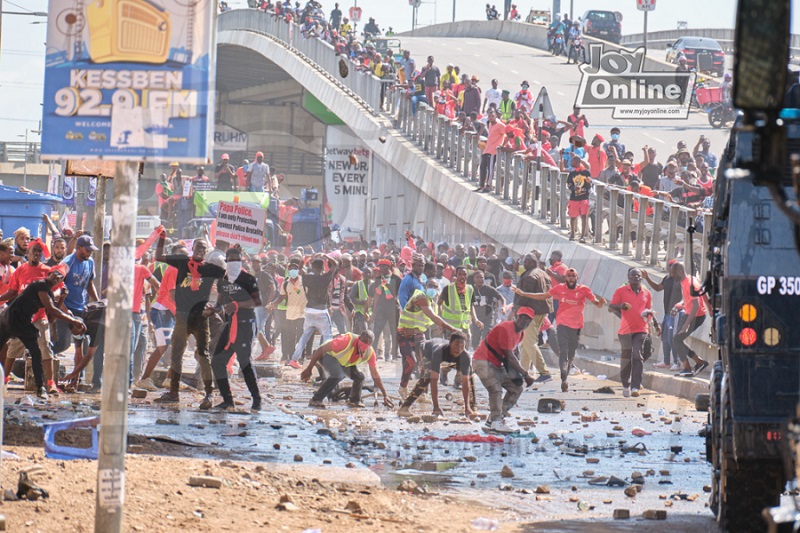
Justifiably, many Ghanaians are expressing their frustrations over the unbearable high cost of living currently ‘afflicting’ the country.
Indisputably, prices of goods and services are skyrocketing to the amazement of many concerned Ghanaians.
Consequently, almost on daily basis, many Ghanaians are openly expressing their frustrations in many places, including homes, lorry parks, markets, schools, restaurants and on radio and television stations across the country.
It was, therefore, not surprising that a blended pressure group calling itself ‘Arise Ghana’ , took to the streets of Accra for two days (28th and 29th June, 2022), noisely protesting to Government over the excruciating hardships confronting many Ghanaians.
Reportedly, the ‘Arise Ghana’ group included civil society organisations, ‘okada’ riders, taxi and ‘trotro’ drivers, market women, some unemployed youth and many members and leaders of the Opposition political parties. Indeed, many members and leaders of the National Democratic Congress dominated the two-day Accra street protests.
The protesters, who were in their thousands, held many placards, some of which read: ‘Reduce High Fuel Prices’ , ‘ Inflation Out of Control’ , ‘Cedi Broken Jail?’ , ‘Food Prices Too High’ , ‘Cost of Living Unbearable’ , ‘ Corruption Galore !! ‘, ‘Scrap E-levy’, ‘Pay NABCO & National Service Personnel’ and ‘Ghanaians Are Suffering’.
Sadly, the first day of the ‘Arise Ghana’ protest or demonstration was punctuated by intense violence, rioting and chaos, thus, some protesters and police officers deployed to protect life and property, sustaining grave injuries on various parts of their bodies.
Really, overwhelming pieces of evidence abound that the demonstrators pelted the police with stones, injuring them and destroying their vehicles in the process. The police, in controlling the ensuing violence and rioters, fired rubber bullets and threw tear gas in attempts to calm the situation.
Indeed, police report confirmed that over 30 protesters were arrested while some of the 12 police officers who were hit by ‘missiles’ thrown at them , were hospitalised.
Security experts say, instead of the police controlling “a crowd of demonstrators” , they rather controlled rioters. But some conveners of ‘Arise Ghana’ also claimed that the police deliberately instigated the riots to derail the demonstration.
Readers, protests or demonstrations being ‘springwells’ of democratic culture, are properly embedded in the belly of our 1992 national Constitution.
Incontestably, in a democratic society, citizens have a right to gather peacefully and protest the policies of their government or actions of other groups with demonstrations, marches, petitions, boycotts, strikes etc.
Direct actions are open in a democracy, but traditionally, they have been used by the oppressed, the disadvantaged or minority groups who feel excluded from other means of influencing government policies. Such protests have always been part of democratic societies.
Today, non-violent protests, often designed to attract the attention of the news media , encompass a wide range of issues.
One special form of direct action is the right of labour unions to conduct strikes against employers with whom they have disputes that have not been resolved at the bargaining table.
Indeed, protests and demonstrations are a testing ground for any democracy. The ideals of free expression and citizen participation are easy to defend when everyone remains polite and in agreement on basic issues.
But protesters and their targets do not often agree on basic issues, and as such, disagreements may be passionate and angry.
The challenge then is balance; to defend the right of freedom of speech and assembly, while maintaining public order and countering attempts at intimidation or violence.
To suppress protests in the name of order, is to invite repression and to permit uncontrolled violent protests, is to invite anarchy. There is no magic formula for achieving this balance.
Probably, that might have been the basis for the violence, rioting and chaos that characterised the first day of the ‘Arise Ghana’ demonstration.
However, the second day of the demonstration, recorded peaceful scenes and episodes along the routes , leading to the Ministry of Finance and Economic Planning and Parliament House, where the protesters presented a litany of demands in their petitions for redress.
Democracies make several assumptions about human nature. One is that, given the chance, people are generally capable of governing themselves in a manner that is fair and free.
Another is that, any society comprises a great diversity of interests and individuals who deserve to have their voices heard and their views respected.
As a result, one thing is true of all healthy democracies; they are noisy !!!
So, readers, is it really the case that demonstrations, protests and citizen actions are testing grounds for any healthy democracy?
Contact: email/ WhatsApp of author: asmahfrankg@gmail.com(0505556179)
By Dr. Akofa Segbefia
